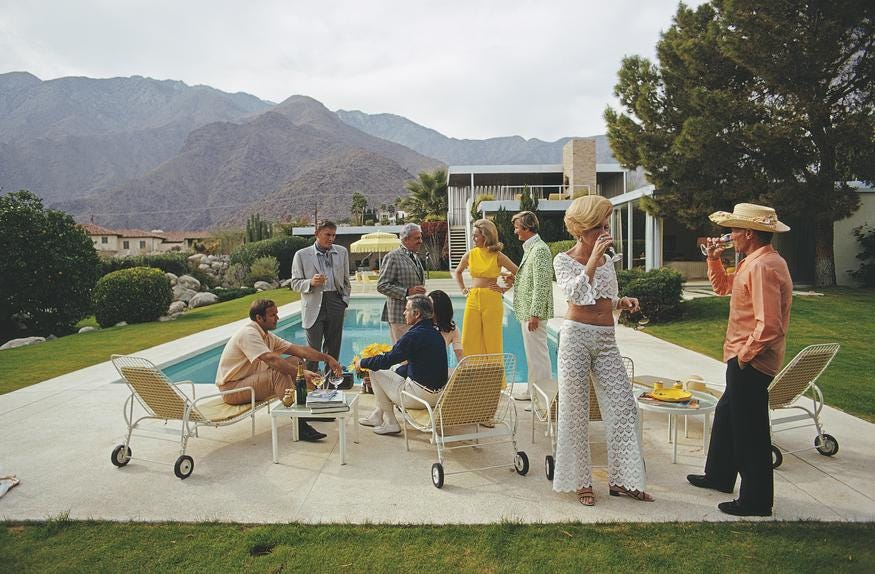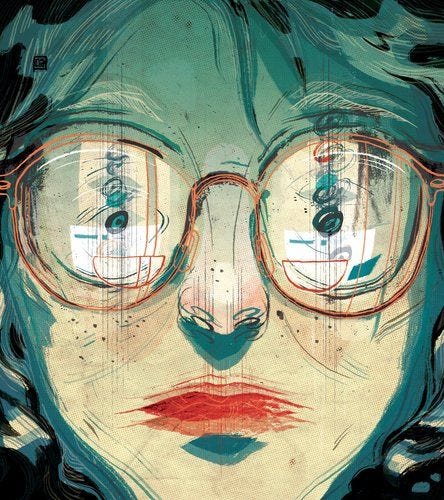Making the Case for Small Talk
Forget "deep" conversations. Short, pleasant interactions are the lifeblood of humanity
David Foster Wallace said these words in his famous commencement speech, "This is Water," at Kenyon College on May 21, 2005.
"The most obvious, important realities are often the ones that are hardest to see and talk about. [...] The choice is really about what to think about these small daily interactions, what perspective to take on them. [...] The really important kind of freedom involves attention and awareness and discipline, and being able truly to care about other people and to sacrifice for them over and over in myriad petty, unsexy ways every day."
Let’s start with an uncomfortable truth.
Many of you reading this are closing yourself off to others, and you’re doing it willingly.
And I understand.
It’s five o’clock on a Friday, you just finished your work week and you need to pick up a few things from the store. It’s busy. You see people you vaguely recognize. You choose to go down the empty magazine aisle to avoid. You dig through your pockets and find your AirPods and pop them in. Some of you won’t listen to anything. It’s a signal.
I’m not here to talk.
Social anxiety is nothing new, but our hesitance to interact with anyone certainly seems to be.
Maybe I’m exaggerating. Maybe it’s an American thing.
But major technological shifts have made conscious disconnecting easier than ever before.
Heads bent towards our phones. Scrolling in the checkout line. It doesn’t matter where we are or who we’re around, we’re still somewhere else.
And if you live in a small town as I do ( <20,000 people) you now have a strange omniscience about everyone around you. Even if you haven’t had a conversation with someone in two years, you know that they have a new baby. They got a divorce. They post their unhinged rants publicly.
The real world has become secondary to the screens we sit in front of most of the day, and many of us are terrified of bridging this gap by accident.
Here’s an embarrassing story
Six months before I started dating my now-wife, I was at a house party with some casual acquaintances. I felt out of my element. I had no one I could pull into the corner and people-watch with over a beer. If I wasn’t actively talking to and meeting new people, I would be “that weird guy”.
I couldn’t let that happen.
I saw a beautiful girl who I’d had one prior interaction with at a bar a few months prior and struck up a conversation.
“Hey, how are you… nice to see you again… what are you drinking…. how’s your day…”
You can imagine it.
As we talked, she mentioned something about her Dad.
“Oh yeah, Victor.”
The words just spilled out.
She looked at me with an eyebrow raised.
“Yeahhhh…”
“I — I uh, saw him on your Facebook.”
“Are we Facebook friends?” She responded.
“No.” She stared at me. “I was looking at your Facebook profile.”
Let’s just say things didn’t get better.
Maybe another woman would’ve found it somewhat endearing (don’t tell me y’all don’t do the same thing), but I remember walking home that night with this bizarre and heavy realization that I’d let my own fantasy-induced scrolling drop on the floor at her feet like a pool of vomit. It was a surreal feeling, and one that I was committed to never repeating.
Either you’ve had an interaction like this, or you’re afraid of one, but this type of anxiety is unique to the social media panopticon we are sucked into for hours of our days.
It’s a 21st-century problem, that requires a 20th-century solution.
You’re Terrible at Talking to Strangers — And That’s OK
When you step outside of your internal monologue, or pause the music and just exist in the real world, it can feel like you’re walking onto stage without knowing your lines.
And this unnerving feeling is rooted in our biology.
We’re social beings, and we evolved in an environment where cooperation, judgment, trust, and altruism all were important for our individual, and collective, survival. And this machine still runs, but for the reasons I discussed above, it’s dusty.
We can get through our days without much interaction, so that’s what we choose to do.
And when we are put into social situations, we often cower within ourselves instead of taking the risk of actually showing interest in those around us.
We return to what’s comfortable, but not what is best for us.
Online, we can present whatever reality that we want to the world. But in the world, our idiosyncrasies, flaws, and awkward smiles become unmasked for all to see.
And because we’re scared of our own flaws, the idea of “small talk” has become demonized as a shallow, meaningless, time-wasting interaction that doesn’t add any tangible value to our lives.
This is a reflection of our neurotic culture, and it couldn’t be further from the truth.
If you are under the impression that small talk automatically involves talking about the weather, it isn’t the act of small talk that’s the problem, it’s you.
Our curiosity about others dictates what we receive in return.
Prior to working as a bartender, I had a limited understanding of how I could start a conversation with a stranger that would be both interesting and pleasant. But as I was forced to interact with people through my work, I had a realization that fundamentally changed my perspective.
People enjoy being asked interesting questions, and it’s not that hard to ask them.
Instead of saying, “How’s your day going?” I started asking people “What’s been the best part of your day so far.”
I framed our interaction with positivity, and nine times out of ten, this one question led to a nice conversation.
And we need nice conversations.
A community is a collection of nice conversations and interactions, and if you are living in a state of perpetual avoidance, you’re willfully choosing to not be part of your community.
It might start with small talk but you’d be surprised where these interactions may lead.
I’ve received job opportunities, made friends, and got special treatment from business owners in my community because I was a pleasant face they recognized.
But the most important thing — and this might sound cliche as hell — is that small talk helped me to cultivate a sense that everything is more right in the world than we think it is.
Outside of the doom-and-gloom digital interfaces that pull us down and divide us, are everyday people with stories, interests, and wisdom. And they need interaction just as much as you do.







Loved the article. I have read about the benefits of non-digital interactions, but I am often disappointed when others don't make the same effort. Well..